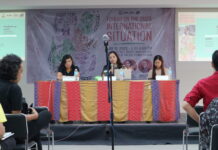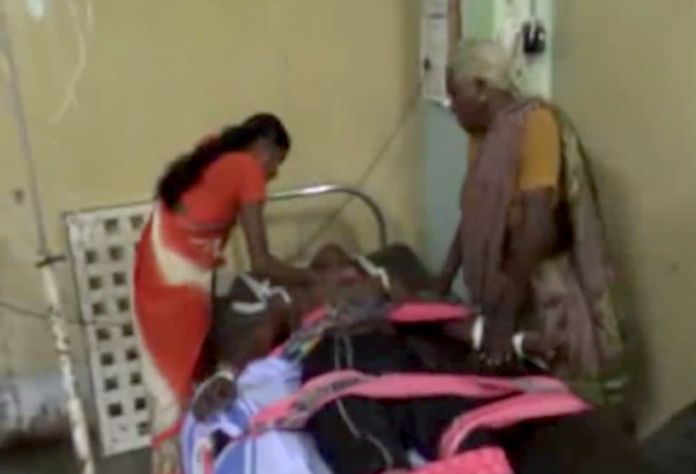An international webinar on 24 June 2021, entitled Pesticides Poisonings in India: Implications for business accountability and regulatory reform, discussed the quest for justice and accountability of a group of Indian farmers who were poisoned by a pesticide marketed by the Swiss agrochemical giant, Syngenta. It also shed light on the way forward for regulating pesticides use both in India and Europe.
The webinar was jointly organised by the Maharashtra Association of Pesticide Poisoned Persons (MAPPP), the Pesticide Action Network (PAN India) and PAN Asia Pacific (PANAP) together with Public Eye and the European Center for Constitutional and Human Rights (ECCHR).
Background
In 2017, hundreds of small-scale farmers and farm workers were poisoned – and over 20 died – in just a few weeks whilst spraying pesticides on cotton fields in the district of Yavatmal in Maharashtra, India. A key product involved was the insecticide Polo, manufactured by Syngenta.
The use of Polo’s active ingredient diafenthiuron is long banned in Switzerland and the European Union but Syngenta keeps selling it in countries where regulations are weaker and less strictly enforced. In 2017, Syngenta exported 75 tonnes of diafenthiuron from Switzerland to India. A Special Investigation Team (SIT) investigated the poisoning in Yavatmal, identified several policy measures and recommended to ban multiple product formulations that were responsible for most of the deaths, including diafenthiuron. Although temporary bans were adopted, today all products are again available on the Indian market.
In September 2020, Public Eye, ECCHR, PAN India and MAPPP filed a “specific instance” with the Swiss national contact point for the OECD Guidelines for Multinational Enterprises, on behalf of a group of 51 affected farmers, to demand that Syngenta provides remedy and changes its sales practices in India. At the same time, a claim for compensation was filed in the court of Basel, by the law firm Schadensanwälte on behalf of the families of two victims who died and a farmer who was severely injured due to the exposure to the pesticide Polo.
In October 2020, Switzerland decided to prohibit the export of five highly hazardous pesticides including diafenthiuron. Just a few weeks later, the Responsible Business Initiative, which proposed to introduce mandatory human rights due diligence requirements for Swiss companies like Syngenta, was narrowly rejected.
The need for corporate accountability
In the webinar, Sri Dewanand Pawar, convenor of MAPPP, highlighted the sufferings of the farming community who were poisoned by the pesticide Polo in Yavatmal in 2017. Farmers and farm labourers suffered a lot, and the District hospital was overwhelmed by the sudden influx of patients, impacting treatment.
In his presentation, Mr. Dileep Kumar, assistant director of PAN India, shared details and evidences of harm caused by the pesticide produced by the agrochemical giant Syngenta, based on pesticide poisoning assessment that PAN India conducted in the region. During 2018 and 2019, the PAN India team reached out to many of the victims of pesticide poisoning and gathered details, such as medical records and police records, container of the pesticides and purchase bills. Kumar noted that “the exclusively accessed police record through the provisions of Right to Information Act itself showed 94 incidents of polo poisonings.” He added that PAN India’s assessment revealed conclusive evidences of Polo usage and consequent poisoning among 54 victims, including two deaths. He mentioned the importance of comprehensive and strong pesticide legislation and monitoring in order to eliminate the harms caused by toxic pesticides.
Christian Schliemann, senior legal advisor of ECCHR, discussed the quest for justice and accountability in Switzerland with regard to the poisoning in Yavatmal India. He stressed the need of making multinational companies accountable when their products contribute to harm and human rights. One action was the complaint filed at the OECD Swiss National Contact Point against Syngenta for violating the OECD guidelines for Multinational Enterprises. Another is the lawsuit in a civil court in Switzerland filed by two women who lost their husbands due to pesticide poisoning, and one farmer who suffered severe health consequences after spraying Polo, demanding compensation from Syngenta for the harm suffered. Schliemann also spoke about the so-called product liability law, which in a nutshell that makes the manufacturer of a product responsible for the harm that users suffer due to defects in the product.
In the following session, Ms Anina Dalbert, legal advisor of Public Eye, highlighted the need for an export ban of hazardous pesticides and mandatory human rights due diligence that multinational companies such as Syngenta must follow. A key victory was an export ban for pesticides banned in Switzerland, which entered into force at the beginning of 2021. “We will keep working towards mandatory human rights due diligence in Switzerland to prevent such human rights violations as well as to hold Swiss based multinationals accountable,” Dalbert said.
Dr. Narasimha Reddy of PAN India, a policy expert and honorary director of PAN India, spoke about the regulatory lacunae in India. Because of this, agrochemical companies are able to escape from product liability and corporate accountability. He highlighted several directions for improving the pesticide regulatory regime, such as easier registration of non-toxic biopesticides, awareness-raising on pesticides, health monitoring of pesticide sprayers, special wards for poisoning patients, and monthly reporting of poisoning incidents to district collectors. Pesticide management should also be decentralized with powers to State governments, so that the regulatory response is quicker and practical.
Concluding the session, Ms Sarojeni Rengam, PANAP executive director, said: “We need justice and accountability for the farmers and agricultural workers who were poisoned by pesticides produced and marketed by Syngenta. The burden of proof should not be on the farmers who are poisoned.”


















